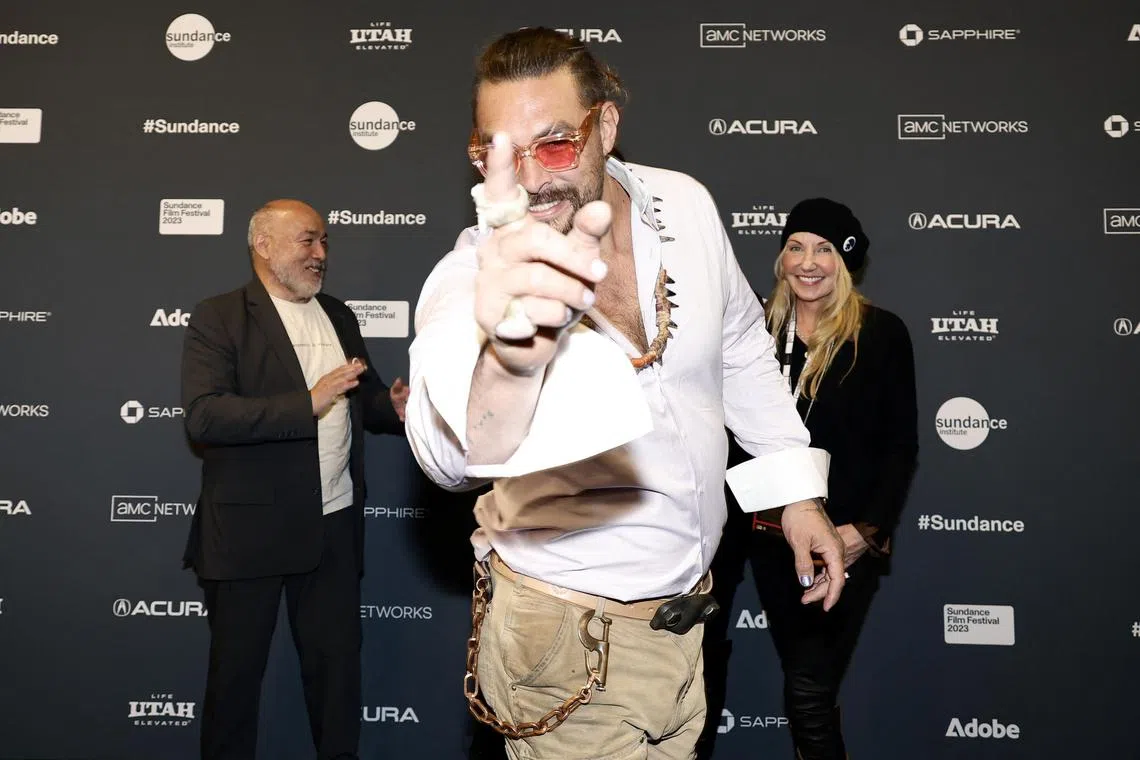Aquaman star Jason Momoa warns Sundance Film Festival of deep-sea mining peril
Sign up now: Get ST's newsletters delivered to your inbox

Jason Momoa (centre) attends the 2023 Sundance Film Festival Deep Rising premiere at The Ray Theatre in Utah on Jan 20.
PHOTO: AFP
Follow topic:
UTAH – He is best known as a hunky, sea-dwelling superhero in the blockbuster movie Aquaman (2018), but actor Jason Momoa brought a stark and sober warning about the perils of deep-sea mining to the Sundance Film Festival last Friday.
The Hawaii-born A-lister narrates Deep Rising, a new documentary about the frenzied efforts by resource-hungry corporations to scrape valuable metals from vast swathes of the floor of the Pacific Ocean.
Supporters of deep-sea mining claim that pellets of nickel and cobalt – used in electric car batteries – can be conveniently scooped off the seabed, helping reduce humans’ reliance on fossil fuels.
But conservation groups and scientists fear this could devastate poorly understood marine systems that play a crucial role in regulating the climate, and some nations have called for bans.
There were moments where he cried and “got emotional” narrating the film, Momoa, 43, said before its world premiere at the festival in Utah, United States.
“It’s very important, using your power for good. It’s all the things I’m passionate about,” added the star, who took marine biology courses as a student and is a United Nations Environment Programme advocate for the oceans.
The documentary follows key players in the fledgling industry including The Metals Company, a Canadian group pushing to mine the Clarion-Clipperton Zone, a vast expanse of seafloor near Hawaii.
It goes behind the scenes as its chief executive Gerard Barron courts wealthy investors with promises that little harm will be done to “the most barren, desolate part of the planet”, in contrast to the devastation that ongoing mining is causing rainforests.
But Deep Rising director Matthieu Rytz said “we know so little” about the real risk to the deep ocean.
“Extraction on the seafloor, it’s just a rush, because we don’t have enough science to really understand what’s happening there,” he said.
Still, The Metals Company has said it expects to be mining 10 million tonnes of material from the ocean floor every year, starting in 2025.
And it is just one of about 20 research institutes or corporations that hold ocean exploration contracts, awaiting the go-ahead to begin commercial-scale mining.
Rytz’s film argues that the energy crisis has no “silver bullet”, and that the brewing race to harvest critical metals is not a solution but “the new oil” and could trigger future resource wars.
It shows meetings of the International Seabed Authority, described by Rytz as an “obscure room in Kingston, Jamaica” where delegates decide “the future of 65 per cent of the planet’s surface”.
“This is beyond national jurisdiction. It’s the high seas,” said Rytz. “It belongs to all of us or none of us.”
Rytz speaks in the film with scientists who argue that alternative clean, more abundant energy sources such as hydrogen should be explored for car engines, or that transport options such as high-speed rail should be expanded.
“We don’t need these metals in the first place,” he said. “The places we’re going to be mining, it’s total damage. There’s no half damage. It’s like clear-cutting a rainforest.”
For Momoa watching the film, “you’re supposed to question things”.
“You’re supposed to sit down and have breakfast, talk about stuff and go, ‘We need to rethink everything.’” AFP

